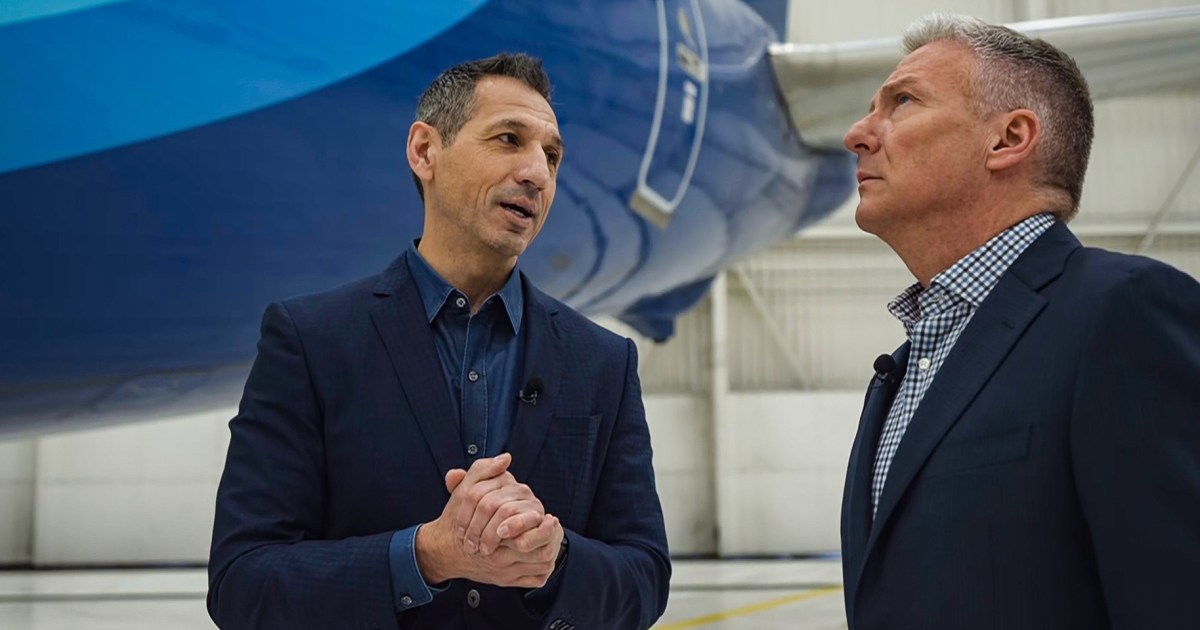If it’s man made expect problems with it plain n simple
plane n simple
It was right there!!!
Is that a lot?
A lot > many > several > a few > a couple > acceptable number of loose screws keeping the flying metal tube intact.
So no, not quite a lot.
Jfc have these people never heard of Loctite or Rocksett?
Well it’s a good thing they did stock buybacks instead of investing in basic safety and inspection practices. Seems to have really worked out well in the long term.
Or instead of investing in a redundancy or software failsafe for the angle-of-attack sensor that was problematic back in 2019.
But then the managers would have got fewer bonuses. How can you be so heartless?
It’s like nobody cares about the shareholders these days.
Maybe we could start a Gofundme or something.
Hmm…don’t they check the bolts occasionally? Seems like they would, but I guess not.
They are brand new planes.
When you get new tires or have them rotated you’re supposed to take them back for tightening after 50-100 miles. Perhaps they ought to update the documentation to take them to the mechanic for a few ugga duggas after a couple flights.
Really? I haven’t been following this closely. I don’t know what the protocol is for new planes either. No inspections then?
They come freshly certified. The operator is then responsible for regular checks at a variety of intensities as the aircraft ages.
The incident aircraft was delivered three months ago.
It’s time to lease some Airbus.
We need more aircraft manufacturers. I don’t care about efficiency. I care about style.
With a bunch of different companies we’d get some truly weird designs. Twin boom tails on a stealth fighter or some shit. A lot of companies means way more ideas which means more weird planes, which we all like.
So I say we save the weird planes and break up the big aerospace companies.
Who knows, maybe we’ll get weird spaceships this time!
Getting these planes from the factory with loose bolts is pretty inexcusable. Boeing’s really fallen far. Kind of crazy that the airline has to go double check that the brand new plane they got from the manufacturer is actually put together properly.
I have known Boeing workers, I called them friends. My friends would tell me how stressful each bolt and rivet can be. Like you have to sign off on all your work, every screw. I don’t know what that environment is like now, but in years past those workers took high pride in their work. And the executives were the ones that caused the problems with their work.
Yaya. I feel like a pretty dramatic shift in how Boeing designs, builds, and signs off on things really has to come from the top first
It’s all subcontracted out now to limit liability, and the workers are understaffed
The FAA is one of the few agencies that still has teeth. They will likely hold Boeing’s feet to the fire because the buck stops with them. I worked for a smaller aircraft manufacturer, and if we outsourced parts that failed, saying “oh it was the other company’s fault” would not be a valid excuse for the FAA. There would still be investigations into our practices, questions about why we didn’t have adequate inspections to verify the parts when they came in, and reviews into our vendor vetting processes. Any fines or disciplinary action would fall on us, not just the negligent outside company. Because at the end of the day, if we hired a negligent company that produced inferior parts, then WE were being negligent.
That said, bigger companies have a lot of connections and sway at the FAA and can do a lot that smaller companies can’t. But with all the repeated issues and bad press, I’m leaning towards Boeing getting raked over the coals.
There are only two government agencies you should never fuck with; the IRS and the FAA. The FDA used to be on that list, but they’ve fallen a bit to regulatory capture in recent years.
To understand Boeing’s situation you have to understand McDonnell Douglas. And we go back to the DC-10 cargo door issue.
That’s a long read, so here’s the short version. The DC-10 cargo door was held on from the outside by rotating latches; when fully engaged the pressure inside the aircraft would push the latches closed so the door was VERY secure, but if the latches weren’t fully engaged the pressure would push the latches open. The telltale showing the cargo operator that the latch was fully engaged wasn’t connected to the latch, but rather the handle, which was itself connected to the latch via a spring. If the operator pushed the latch closed too hard or too fast, the spring would bend, and the telltale would show the door as latched, even though it wasn’t.
If the door flies open in flight that means explosive decompression of the cargo area. That means the pressure of the air in the passenger cabin pushing down on the floor is huge, measured in tons per square meter. It’s worth noting that the control cables that carry movement from the yoke to the rudder/elevator control surfaces in the tail go through the floor.
One of these failed on a mostly empty flight. The floor buckled and a few seats were sucked down the floor out of the airplane. The pilots lost all rudder control but miraculously were able to land the jet without further injury. FAA investigated and found the problem, Douglas made a ‘gentleman’s agreement’ with FAA that they would fix this quietly without an embarrassing Airworthiness Directive (forcing all operators to comply and damaging Douglas’s reputation). At all points, the priority for Douglas management was avoiding bad reputation and excess expense, not making sure the aircraft were safe.
A European operator then wasn’t subscribed to Douglas’s maintenance service so the update never happened. And another one failed- this one on a VERY full flight with ~350 people on it. The added weight on the floor caused a much larger section of the floor to fail, the control lines were all severed, and the plane crashed with no survivors.
In the 1990s, McDonnell Douglas and Boeing merged. The Boeing management team (mostly engineers) was replaced with the Douglas management team (bean counters). Their headquarters then moved from Seattle (where they build planes) to Washington, DC (where they lobby for federal contracts).
Granted it’s 30 years after that merge, but it’s pretty obvious the same management strategy is still in charge.
Take the 787 Dreamliner. Their strategy there was reduce all the expensive engineers, instead just write the specs and outsource design and build of entire subsystems. It had lots of teething problems, I’ve heard reports that some parts with tolerances measured in tenths of a millimeter were off by half an inch or more (and that was the reject pile, ones off by less were ground down and hammered into place). Other than some battery problems the aircraft has been pretty safe though.
And now take the MAX product line. A few years back you had issues with MCAS- a computer that makes the new jet fly like the old jet so pilots won’t need retraining, even though the new jet ISN’T like the old jet and flies quite differently and if MCAS fails you’ll have a very different beast on your hands (none of this was mentioned in the operation manual). That caused some crashes.Now you have this door plug issue. It’s worth noting that Boeing has outsourced assembly of the entire fuselage to another company, who (from what I’ve read) is constantly pressured to increase production and decrease costs. NOT a safety culture.
From some reports I’ve read, procedure at the other company was to make the bolts on the door plug ‘finger tight’ for transport, because not all customers would want the door plug, some would want the actual emergency exit door. So that means with a little bit of vibration on those bolts, the door plug is only held in place by gravity and prayers.
FAA is now supposedly doing some kind of major audit of Boeing manufacturing, and is considering no longer allowing Boeing to self-certify their quality control processes. I’m quite sure it’ll turn up a lot of dirt.
What I HOPE happens is that the market, both the stock market and the aircraft market, heavily punish Boeing and/or demand that their management be replaced. I’m not holding my breath though.Man this is a very informative, scary and infuriating write-up. Thank you for sharing.
I understand the need for corporations but I also get so fucking angry knowing that no-one ever gets criminally charged for negligence in cases like this.
Charging anyone with a ‘crime’ for something like this is really hard. You have to prove that a. someone in authority, b. knew that a deficiency existed, and c. explicitly directed the deficiency to exist or that it not be fixed, d. knowing that doing so was against regulations or policy or could cause a crash.
‘We did the best we could but it wasn’t good enough’ is a defense against criminal charges, especially when you can produce reams of paper showing how hard you tried.
There’s a saying- airplane safety is like swiss cheese. Every layer has holes, the more layers you stack on top of each other, the less likely there will be holes that line up from top to bottom. Doubtless even with Boeing crappy leadership there are still plenty of layers, there was just some change that was communicated but didn’t get routed to the right department or something.
It’s not illegal to drive your suppliers hard. It’s not illegal to push for higher production and lower costs.
So chances are this door plug thing will be a series of such mistakes, where everybody was ‘doing it right’ but not coordinated enough so the net result was it got done wrong.
The best solution would be to fire most/all of Boeing management, ideally without golden parachutes. That will only happen if their stock takes a BIG dive, AND if investors recognize that the current fuckup is only because of that management. I don’t know what their current investor makeup is. But I think THAT will only happen if a number of big customers start cancelling orders, or if there is major FAA enforcement action.
Cancelling an order is a major undertaking for an air carrier. Most aircraft aren’t directly owned by their carriers, there is a complicated financial structure where the aircraft itself and each of the engines are leased/financed and are technically the property of some finance group. These deals take months to set up and millions to unwind. Plus the air carrier will have further millions invested in other parts of the deal- their mechanics are trained on that manufacturer aircraft, they have parts supply deals, pilots are trained to fly that model aircraft, etc.So for any airline to just ‘dump Boeing’ is a monumental and very expensive effort. That’s why all the carriers are taking measured ‘wait and see’ stances with statements like ‘we are working closely with FAA and Boeing to ensure the safe return of these aircraft to flight’ rather than ‘we’re unloading this junk and buying better airplanes’ or even ‘we’ve halted our purchase of further MAX airframes’.
There’s also the question of supply- even if a carrier WAS to dump Boeing, it’s unlikely that Airbus could increase production by any meaningful rate. And it’s not exactly like Airbus has a ‘stock’ of dozens of aircraft sitting around waiting for customers. The aircraft are built to order.What may hopefully happen, is Boeing itself is found liable for some huge negligence, and given an astronomical fine as well as forcing Boeing to pay for major refits of all customer airplanes. That might be enough to get investors to act on removing Boeing’s leadership.
If they required professional engineers to be in charge,and to sign off, you don’t need any crime. Screw up, lose your license, be provided from working. But “industry” bought an exemption in congress from licensing law.








